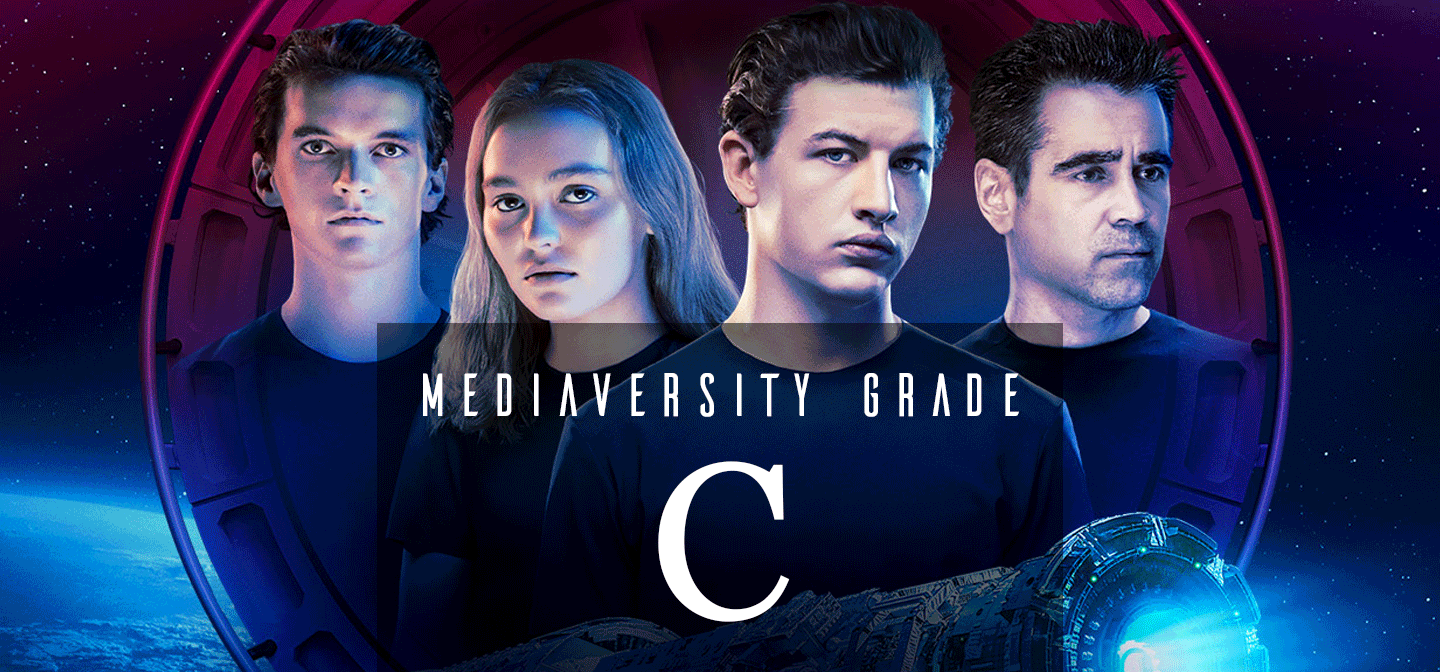Voyagers
“Racial diversity exists in Voyagers but severe limitations remain in place.”
Title: Voyagers (2021)
Director: Neil Burger 👨🏼🇺🇸
Writer: Neil Burger 👨🏼🇺🇸
Reviewed by Li 👩🏻🇺🇸
Note: This review was commissioned by Lionsgate. The content and methodology remain 100% independent and in line with Mediaversity's non-commissioned reviews.
—SPOILERS AHEAD—
Technical: 3/5
The conceit behind William Golding’s classic novel Lord of the Flies, of kids squaring off in a Darwinian bid for survival, has fascinated audiences for decades. Director-writer Neil Burger rinses and repeats this hook for his sci-fi thriller Voyagers, but moves the feral teens to outer space onboard the claustrophobic shuttle, the Humanist.
Voyagers entertains well enough if you aren’t too fussed about originality. Its script follows along predictable beats, with crew members quickly splitting into factions of Good vs. Evil as primal urges of sex and violence bubble to the fore. Some die, some triumph. Yadda yadda, so on and so forth. You likely won’t be bored, but neither will you miss a thing if you choose to skip this title.
Gender: 3.5/5
Does it pass the Bechdel Test? YES
Seeing women in STEM continues to pull representation forward; however, depth of character matters, and in this regard, Voyagers fails. It’s a shame, because Burger starts off strong as the film opens with a Black woman (April Grace) presenting an overview of the Humanist’s mission to a room full of executives, followed by a blonde IVF technician (Laura Dreyfuss) peering into a microscope. But their scenes flicker past with handfuls of seconds apiece, and before long we’re left with just a few female characters who actually have recurring scenes.
Among them, only one impacts the plot in a meaningful way: the ship’s Chief Medical Officer, Sela (Lily-Rose Depp). Burger presents her in a positive light, clever and athletic, but her personality falls firmly along existing gender lines. She serves as the emotional heart of the film, introduced as a depressed and insecure young woman who relies on the mission’s only adult crew member, Richard (Colin Farrell), to bring her out of her shell.
She’s soon defined by another man. Voyagers’ two-dimensional villain, Zac (Fionn Whitehead), undergoes a hormonal awakening and explores his newfound feelings through violence and sexual intimidation, grabbing Sela’s boobs without her consent as he threateningly towers over her. Of course, not to worry—the film’s de facto hero, Christopher (Tye Sheridan), interrupts them and protects Sela from further harm. Shunted between the film’s two alpha males, Sela might enjoy a positive role as a doctor who has leadership qualities, given the way other crew members willingly follow her. But her entire character is developed through her relationships with men.
In short, women might be superficially equal to men in Voyagers, holding comparable positions of power and seen through a gender-balanced cast, at least by tally alone. But functionally, women are undervalued and stereotyped as emotional. (When the Humanist experiences its first onboard death, it’s a young woman who bursts into tears, another girl comforting her.)
Ultimately, a look at how little we actually hear from women demonstrates their ornamental function: Captured with arementalkingtoomuch.com, women command less than a quarter of the film’s dialogue.*
Race: 2.75/5
Racial diversity exists and race-based stereotypes are nonexistent, but severe limitations remain in place. For starters, all main characters—Zac, Sela, Christopher, and Richard—depicted in this review’s header image—are white. Of the characters of color who do occur in supporting roles, their storylines never incorporate cultural identity, which renders them colorblind and shallow. Plus, the colorism in casting is real: Everyone is pretty light-skinned.
The ensemble of Voyagers. Photo Credit: Courtesy of Lionsgate
Frustratingly, characters of color also occupy a majority of the film’s body count. Yes, two white men are seen passing away, but they hold major roles while two Brown characters and one Black woman—who conveniently happens to be the darkest-skinned character in the film (Chanté Adams, depicted at far left in the image above)—are deemed disposable. Meanwhile, white and East Asian crew members comprise most of the surviving colonists.
Speaking of colonists, it feels like a miss that Voyagers pursues a narrative of colonization without a hint of awareness around the topic. In the story, humans have ruined Earth and now need to reach a new planet to inhabit. Okay, fine. But when crew members discover a secret stash of superpowered weapons onboard the Humanist, for the presumed purpose of blasting any indigenous species they may encounter upon reaching their new home, the characters’ blithe acceptance of this pending genocide sits strangely. It’s especially odd for Sela and Christopher, who pursue a peaceful path as the saviors. Yet they never pause for even a moment to show consternation at the space mission’s darker side.
Deduction for LGBTQ: -0.25
Given the crew members’ directive to procreate while on the ship, this leaves no value placed on queer or same-sex relationships that won’t produce offspring. The film still could have included queer relationships, since all of the crew members were genetically designed and fertilized in vitro anyway. Instead, Voyagers actively pursues a premise that valorizes fertility and straight couplings.
Deduction for Disability: -0.25
On a similar note, since the teenagers onboard the Humanist were selected by scientists for their biological fitness, disabilities are intentionally absent from the screen. The result is a film that alludes to disabled people as “unfit” for the continuation of the species by omission.
Mediaversity Grade: C 2.92/5
Although racially diverse and featuring a capable if tropey female protagonist, the fact remains that Voyagers is not at all inclusive. The narrative still follows the power dynamics between straight white men—Christopher and Zac. Meanwhile, LGBTQ and disabled characters have been left behind on planet Earth, unapologetically barred from the script’s limited vision of who constitutes humankind’s best and brightest.
* Captured by author with arementalkingtoomuch.com, gender shares of speaking time in Voyagers were split 24m 40s for men vs. 7m 17s for women—or 77% male, 23% female, with no characters in the film presenting as nonbinary.





